|
|
|
Sort Order |
|
|
|
Items / Page
|
|
|
|
|
|
|
| Srl | Item |
| 1 |
ID:
165753
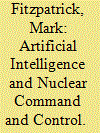

|
|
|
|
|
| Summary/Abstract |
An IISS tabletop exercise showed how an AI arms race could reduce strategic stability as nuclear-weapons states become more reliant on artificial intelligence.
|
|
|
|
|
|
|
|
|
|
|
|
|
|
|
|
| 2 |
ID:
143165
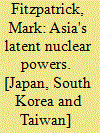

|
|
|
|
|
| Publication |
London, IISS, 2016.
|
| Description |
175p.pbk
|
| Series |
Adelphi Paper Series; 455
|
| Standard Number |
9781138930803
|
|
|
|
|
|
|
|
|
|
|
|
Copies: C:1/I:0,R:0,Q:0
Circulation
| Accession# | Call# | Current Location | Status | Policy | Location |
| 058442 | 327.1747/FIT 058442 | Main | On Shelf | General | |
|
|
|
|
| 3 |
ID:
072901
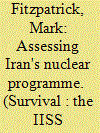

|
|
|
|
|
| Publication |
2006.
|
| Summary/Abstract |
The many indicators of military involvement in Iran's nuclear programme strongly suggest that Iran seeks more than just a latent nuclear-weapons capability, although not necessarily an all-out Manhattan Project-style effort. Depending on assumptions about technical variables, the earliest Iran might be able to produce enough highly enriched uranium for a nuclear weapon is assessed to fall between the end of 2008 and 2010, a range that might be said to be within the margin of error, given the unknowns about the pro gramme and the inspectors' sharply decreased access. This timetable provides room for diplomacy. There are strong arguments, with universal appeal, for opposing an Iranian nuclear-weapons capability.
|
|
|
|
|
|
|
|
|
|
|
|
|
|
|
|
| 4 |
ID:
077360
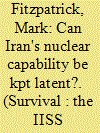

|
|
|
| 5 |
ID:
086129
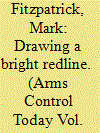

|
|
|
|
|
| Publication |
2009.
|
| Summary/Abstract |
If Iran goes nuclear, so too will more of its neighbors, or so says the established wisdom.
It is a logical deduction given the extent to which Egypt, Saudi Arabia, and Turkey feel a need to maintain power and political parity with Iran and the security concerns that Persian Gulf countries already harbor about the would-be regional hegemon to their northeast. If any of them follow Iran or if Israel abandons its policy of nuclear opacity, the domino effect could spread further and include counties, such as Algeria, that have sparked proliferation concerns in the past.
A proliferation cascade in the Middle East is not a foregone conclusion. Adroit policy choices and practices by the Obama administration can build a bulwark against a Middle East nuclear tipping phenomenon.
|
|
|
|
|
|
|
|
|
|
|
|
|
|
|
|
| 6 |
ID:
141115
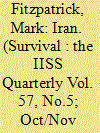

|
|
|
|
|
| Summary/Abstract |
The more I study the Iran nuclear deal, the more deeply I appreciate its worth. The Joint Comprehensive Plan of Action (JCPOA) agreed in Vienna on 14 July is better than all three of its antecedents. It goes beyond the political accord struck in Lausanne on 2 April, walking back from none of the parameters of that accord as described by the United States.1 Among other virtues, the verification procedures of the JCPOA are tighter than the safeguards provided for in the Additional Protocol. The constraints and obligations Iran accepts under the deal also go beyond the Nuclear Non-Proliferation Treaty (NPT). The deal can be characterised as Lausanne-plus, Additional Protocol-plus and NPT-plus.
|
|
|
|
|
|
|
|
|
|
|
|
|
|
|
|
| 7 |
ID:
173655
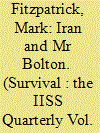

|
|
|
|
|
| Summary/Abstract |
It is incredible for John Bolton to say, in The Room Where It Happened, that avoiding a conflict with Iran was ‘irrational’.
|
|
|
|
|
|
|
|
|
|
|
|
|
|
|
|
| 8 |
ID:
068448
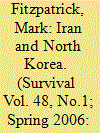

|
|
|
| 9 |
ID:
116643
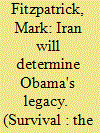

|
|
|
|
|
| Publication |
2012.
|
| Summary/Abstract |
Most of them having breathed a sigh of relief at the outcome of the US presidential election, legions of America-watchers around the world now wonder how President Barack Obama will use his renewed mandate in the foreign policy arena. They are acutely aware that foreign-policy issues played little role in the election campaign. Even the presidential candidates' debate that was supposed to bear on global matters pivoted back to domestic economic and education issues. No foreign-policy initiatives were enunciated during the campaign. The logical conclusion is that Obama will carry on as he has been in the foreign-policy realm, avoiding impossible issues such as the Israeli-Palestine quagmire and managing inescapable problems through the application of reasoned pragmatism. Knowing first-hand the aphorism attributed to Harold Macmillan of how it is 'events, dear boy, events' that blow governments off course, his policies are likely to be reactive rather than proactive.
|
|
|
|
|
|
|
|
|
|
|
|
|
|
|
|
| 10 |
ID:
157203
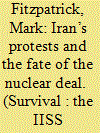

|
|
|
|
|
| Summary/Abstract |
Opponents of the 2015 Iran nuclear deal have seized on the popular protests engulfing Iranian cities as a new reason for attacking the agreement.1 It is of no relevance to them that the protesters, while angry at not seeing the promised benefits of the deal, formally known as the Joint Comprehensive Plan of Action (JCPOA), are not denouncing it or calling for foreign sanctions against Iran. The logic of the JCPOA’s opponents, rather, seems to be that, because protesters are criticising their government, foreign powers should, in solidarity, similarly attack the Tehran authorities by imposing economic penalties.
|
|
|
|
|
|
|
|
|
|
|
|
|
|
|
|
| 11 |
ID:
085363
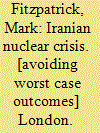

|
|
|
|
|
| Publication |
London, International Institute for Strategic Studies, 2008.
|
| Description |
99p.
|
| Series |
Adelphi paper; 398
|
| Standard Number |
9780415466547
|
|
|
|
|
|
|
|
|
|
|
|
Copies: C:1/I:0,R:0,Q:0
Circulation
| Accession# | Call# | Current Location | Status | Policy | Location |
| 054075 | 355.82511909581/FIT 054075 | Main | On Shelf | General | |
|
|
|
|
| 12 |
ID:
160908
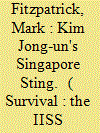

|
|
|
|
|
| Summary/Abstract |
By talking directly with Kim Jong-un, Donald Trump did achieve something unprecedented, but it was all in Kim’s favour.
|
|
|
|
|
|
|
|
|
|
|
|
|
|
|
|
| 13 |
ID:
076715
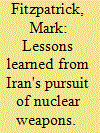

|
|
|
|
|
| Publication |
2006.
|
| Summary/Abstract |
Tipped off by Iran's efforts to acquire uranium enrichment and plutonium reprocessing technology, despite the economic illogic, the United States and its allies identified Tehran's nuclear weapons intentions early on and took effective action to stop several countries from inadvertently assisting that program. This postponed the worst-case scenario of when Iran might have the bomb, which for 15 years has been estimated at being five to ten years away. The intelligence success gave insufficient attention, however, to Iran's procurement efforts through non-state actors on the black market. Intelligence on Iran's motivations also will be important to devising effective policies. Those motivations include a need to achieve prestige, assert national pride, and secure dominance in the Gulf region. Iran's clerical leaders also see a nuclear capability as the best way to ensure their survival despite outside threats and internal opposition. At least 10 indicators of military involvement in the program have become known, reinforcing the judgment that Tehran is still intent on developing a latent nuclear weapons capability. Despite the confirmed evidence, the international community has not been able to change Iran's strategic calculations. The intelligence indicators will need to be corroborated if the world is to summon the will to put firm pressure on Iran to stop its nuclear pursuits.
|
|
|
|
|
|
|
|
|
|
|
|
|
|
|
|
| 14 |
ID:
180426
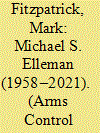

|
|
|
|
|
| Summary/Abstract |
Journalist David E. Hoffman said, “Michael Elleman was a pioneer, determined to make the world safer.” Recalling a 2004 interview for his book The Dead Hand, about the dangerous legacy of the Cold War arms race, Hoffman noted that, at Lockheed Martin Corp. in the 1980s, Elleman had worked on the Trident D5 missile, but decided it would be better to eliminate than to create these dangerous weapons. He pursued that goal as an engineer, a government contractor, a UN inspector, and lastly as a think tank expert.
|
|
|
|
|
|
|
|
|
|
|
|
|
|
|
|
| 15 |
ID:
150284
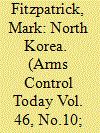

|
|
|
|
|
| Summary/Abstract |
North Korea is the biggest blemish on President Barack Obama’s nonproliferation record. Pyongyang’s four nuclear tests and more than 50 missile and rocket launches during the past eight years have given it a capacity to rain nuclear warheads on its regional adversaries and a good start to be able soon to reach the U.S. homeland.
|
|
|
|
|
|
|
|
|
|
|
|
|
|
|
|
| 16 |
ID:
120483
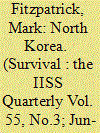

|
|
|
|
|
| Publication |
2013.
|
| Summary/Abstract |
Regime change is not an immediate answer to the current challenges posed by the Democratic People's Republic of North Korea (DPRK). But North Korea's bellicose actions and statements since late 2012 reinforce the conclusion that, in the long run, there is only one happy ending to this long-running tragedy: unification of the Korean Peninsula as a democratic, free-enterprise-based republic that would be free of nuclear weapons.
|
|
|
|
|
|
|
|
|
|
|
|
|
|
|
|
| 17 |
ID:
151607
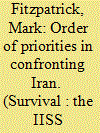

|
|
|
|
|
| Summary/Abstract |
It is far better to implement an incomplete but effective nuclear agreement than to scrap it, hoping to achieve the best outcome while ending up with the worst.
|
|
|
|
|
|
|
|
|
|
|
|
|
|
|
|
| 18 |
ID:
128327
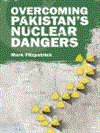

|
|
|
|
|
| Publication |
Oxon, IISS Routledge, 2014.
|
| Description |
171p.Pbk
|
| Series |
Adelphi Series No.443
|
| Standard Number |
9781138796676
|
|
|
|
|
|
|
|
|
|
|
|
Copies: C:1/I:0,R:0,Q:0
Circulation
| Accession# | Call# | Current Location | Status | Policy | Location |
| 057680 | 355.825119095491/FIT 057680 | Main | On Shelf | General | |
|
|
|
|
| 19 |
ID:
127318
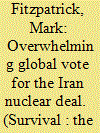

|
|
|
|
|
| Publication |
2014.
|
| Summary/Abstract |
One thing that is clear about the interim nuclear deal with Iran, reached on 24 November in Geneva, is that much of the world supports it. Nearly 70 nations have expressed that support formally. Nations liked that it capped Iran's programme, averted prospects for war, and showed light at the end of the sanctions tunnel. When members of the US Congress talk about legislating what a final deal with Iran must achieve, they ought to consider that the other parties to the negotiation also have a vote.
|
|
|
|
|
|
|
|
|
|
|
|
|
|
|
|
| 20 |
ID:
122003
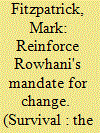

|
|
|
|
|
| Publication |
2013.
|
| Summary/Abstract |
Foreign reactions to Hassan Rowhani's 14 June election as Iran's next president ranged from delight to dismay. A better response is cautious optimism. Rowhani will not be able to solve the nuclear crisis. Nor is he likely to do much that will make it worse than would be the case under any other Iranian leader. But he has a mandate for change and a disposition towards pragmatism which provide a ray of hope.
|
|
|
|
|
|
|
|
|
|
|
|
|
|
|
|
|
|
|
|
|